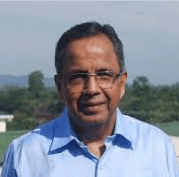The theme of the 5th and last day of Immuno-Jaipur was Clinical Immunology, which included talks from researchers that conduct translational research. In this article we shall highlight talks by Dr Narinder Mehra and Rajalingum Raja, who presented talks that focused on Human Leukocyte Antigen (HLA) system immunology.
 Dr. Narinder Mehra, opened the 5th day of Immuno0-Jaipur with his lecture on “MHC and Transplantation Immunology”. He began his talk by shedding light on the function of HLA and their significance in transplantation. He shared the story of Johana Nightingale who is the longest surviving kidney transplant patient. There are around 21,499 alleles of HLA in humans (including 15,381 HLA-I and 5368 HLA-II alleles) have been identified. In addition, out of 224 MHC genes identified, 128 are reported to be expressed. He then explained the discovery of first allele of HLA-A2 which was called MAC in 1958. He then briefly described the function of HLA and their significance in transplantation.
Dr. Narinder Mehra, opened the 5th day of Immuno0-Jaipur with his lecture on “MHC and Transplantation Immunology”. He began his talk by shedding light on the function of HLA and their significance in transplantation. He shared the story of Johana Nightingale who is the longest surviving kidney transplant patient. There are around 21,499 alleles of HLA in humans (including 15,381 HLA-I and 5368 HLA-II alleles) have been identified. In addition, out of 224 MHC genes identified, 128 are reported to be expressed. He then explained the discovery of first allele of HLA-A2 which was called MAC in 1958. He then briefly described the function of HLA and their significance in transplantation.
 Dr. Rajalingam Raja, gave a lecture on “Crossing histocompatibility challenges in solid organ transplantation”. Following on the lecture by Dr. Mehra, he provided a brief understanding of histocompatibility systems and the role of HLA in the rejection of allografts in the recipients. He provided functional and locus specific classification of HLA class 1 and 2 genes. He shed light on the highly polymorphic nature of HLA loci, which results in graft/transplant rejection due to recipient’s immune system mounting a response against the donor’s tissue. His second lecture titled “NK cells in clinical transplantation and cancer immunotherapy” discussed the the role of HLA C 1 and C 2 in allogenic graft rejection, due to polymorphism. He then highlighted how NK cells have been associated in transplant rejection via HLA specific Killer cell Immmunoglobulin like receptor (KIR). The KIR and HLA are highly polymorphic and assort independently. Therefore, NK cells express KIR that recognize allelic variants of HLA which is not expressed by the host in normal physiological condition. This results in the KIR being activated by alien HLA molecules resulting in the rejection of the graft. By understanding the combination of KIR and HLA ligands, the graft rejection and disease response of an individual could be understood and the success of graft could be improved.
Dr. Rajalingam Raja, gave a lecture on “Crossing histocompatibility challenges in solid organ transplantation”. Following on the lecture by Dr. Mehra, he provided a brief understanding of histocompatibility systems and the role of HLA in the rejection of allografts in the recipients. He provided functional and locus specific classification of HLA class 1 and 2 genes. He shed light on the highly polymorphic nature of HLA loci, which results in graft/transplant rejection due to recipient’s immune system mounting a response against the donor’s tissue. His second lecture titled “NK cells in clinical transplantation and cancer immunotherapy” discussed the the role of HLA C 1 and C 2 in allogenic graft rejection, due to polymorphism. He then highlighted how NK cells have been associated in transplant rejection via HLA specific Killer cell Immmunoglobulin like receptor (KIR). The KIR and HLA are highly polymorphic and assort independently. Therefore, NK cells express KIR that recognize allelic variants of HLA which is not expressed by the host in normal physiological condition. This results in the KIR being activated by alien HLA molecules resulting in the rejection of the graft. By understanding the combination of KIR and HLA ligands, the graft rejection and disease response of an individual could be understood and the success of graft could be improved.
Article by Rushikesh Patil, Dimpu Gogoi and Mr. Naythan D’Cunha











